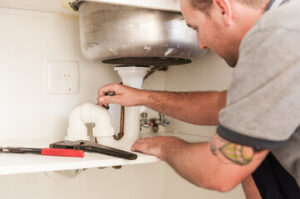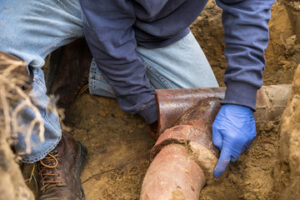Plumbers are responsible for installing, repairing, and maintaining the water and sewage systems that keep our modern lives running smoothly. This important career requires a unique combination of skills and physical stamina.

Visually inspect accessible pipes, fixtures and appliances for leaks, damage and signs of rust. Also check drain lines and toilets for proper drainage and venting. Contact Plumber Rosenberg TX for professional help.
Plumbing is considered a skilled trade, and becoming a plumber requires extensive training. Typically, aspiring plumbers begin their journey through an apprenticeship program or trade school before moving on to obtain a plumbing license. Once licensed, they are ready to take on a variety of plumbing tasks ranging from installing kitchen and bathroom fixtures to repairing sewer lines and water heaters. While plumbing is a highly technical field, it also demands soft skills like effective communication and the ability to work independently.
Plumbing systems are essential in residential, commercial, and industrial settings to facilitate clean drinking water, proper drainage, and efficient appliances. Whether you’re working on the installation of a new kitchen sink or a complex piping system for a manufacturing facility, you need to be familiar with all aspects of the job. Plumbers also need to be able to read and interpret blueprints, which requires dexterity, an understanding of math and physics, and the ability to understand engineering diagrams.
In addition to specialized training programs, many vocational schools and trade organizations offer continuing education courses on advanced plumbing techniques and skills. These workshops and seminars provide an opportunity for apprentices to expand their knowledge and stay current with the industry’s latest technologies. Additionally, obtaining advanced certifications can help plumbers demonstrate their expertise to prospective clients and employers.
While a career as a plumber is highly rewarding, it’s not for everyone. Plumbing can be physically demanding, requiring regular exertion and the ability to work in tight spaces. Additionally, plumbers often work with chemicals, sewage, and other hazardous materials. For these reasons, it’s important for plumbers to maintain a high level of physical fitness and safety awareness at all times.
In addition to acquiring the necessary skill set and training, plumbers must have a strong desire to succeed and be able to work on a team or alone. A love for solving problems is another key trait for this career, as plumbers regularly encounter issues that require creative thinking to resolve. Additionally, strong communication and customer service skills are important for interacting with customers and building trust.
Apprenticeship
Most plumbers spend four to five years as an apprentice before becoming a journeyman. During this time, they receive extensive hands-on training and earn a significant salary while they learn the trade. The average starting wage for a plumber is around $33,000, although this figure can rise with experience and credentials earned. The apprenticeship program offers a highly flexible schedule that can be tailored to fit the apprentice’s work commitments.
Apprentices learn how to install a variety of plumbing fixtures and equipment in residential and commercial buildings. They also learn the layout (or design) process and how to read blueprints to determine the proper sequence of installation for piping and fixtures. This includes installing and repairing water supply, waste, vent and fuel-fired heating systems in homes and businesses. The apprentice may also assemble, fabricate and install a variety of piping materials and equipment for steam, hot water, air conditioning, and heating systems in hospitals, hotels, homes, warehouses and factories.
A Plumber/Pipefitter/Steamfitter Apprentice lays out, fabricates, assembles and installs pipes, fittings, fixtures, appliances and devices of all types and sizes, according to specifications and plumbing codes. An Apprentice reads blueprints and working drawings to determine the proper sequencing of installation, prepares work related tools for use on the job, and is proficient with all types of construction machinery and electrical equipment used in the pipe trades.
The Plumbers Local 24 Education Fund School conducts its apprenticeship and journeymen training programs at 20 Fairfield Place in West Caldwell, New Jersey. It admits students of any sex, race, color, creed, national and ethnic origin to all the rights, privileges, programs and activities generally accorded or made available to students at the school.
During an apprenticeship, you’ll receive on-the-job training from a master plumber and attend post secondary RTI courses. The Middlesex County Adult Technical Schools offer RTI courses to apprentices enrolled in a union sponsored Apprenticeship. Apprentices are assigned courses by the County Apprenticeship Coordinator, at the Annual Mandatory Apprentices Meeting conducted before Labor Day (see Evening School Calendar). Pre-apprenticeship or occupational experience cannot be substituted for RTI course attendance.
On-the-Job Training
Whether it’s fixing a leaky faucet or designing and installing new plumbing systems, plumbers are always working with their hands. This career can be challenging, but it also offers excellent earning potential. It’s no wonder why many students are interested in becoming licensed professional plumbers. But before you start dreaming of a high salary, you’ll need to complete the right training program.
The best way to begin your journey toward a plumbing career is to enroll in a vocational-technical school that provides an apprenticeship. These programs usually last for about 18 to 24 months and offer industry-recognized qualifications that you can use to pursue employment opportunities in the field. They will also prepare you to take the state journeyman plumber exam and will include on-the-job training with a professional master plumber who can provide the hands-on experience and real-world knowledge that you’ll need to succeed in the industry.
Another great option for students looking to become professional plumbers is to pursue online education. Some students may be skeptical about online learning, fearing that it won’t give them the hands-on experience they need. But, there are actually several programs that offer apprenticeships or job placement assistance while you’re learning through online instruction. One such program is NexTech Academy’s Plumbing Program, which partners you with a local trainer to complement the course materials you’re learning, allowing you to gain on-the-job experience and earn your degree in just 18 to 24 months!
As you begin your career as a plumber, you’ll likely work for a plumbing company or an independent contractor. Your responsibilities will include repairing, maintaining and replacing pipes and fixtures as well as removing and installing water heaters. In some cases, you’ll even be called upon to perform specialized tasks such as sewer cleanup and backflow testing. Regardless of the nature of your assignments, your duties as a plumber will be to ensure that all of your clients receive safe and reliable water service. This requires a high level of expertise and the ability to troubleshoot complex problems quickly and efficiently. This makes it important for you to stay up-to-date on the latest advances in the plumbing industry, which you can do by regularly attending workshops, seminars or online courses.
Licensing
Plumbing is a trade that requires licensing at several levels. Most states have three basic requirements: apprentice, journeyman and master plumbers. Apprentices start their careers working under more experienced tradesmen, soaking up knowledge and learning the ropes. Many apprenticeship programs also require classroom study to learn the theoretical side of plumbing, like pipe systems and safety procedures. Some vocational schools also offer on-campus classes to help students prepare for their apprenticeships and licensing exams. Veterans may also receive training in the plumbing trade through their military service, which can count towards their apprenticeship and license.
Once an apprentice has worked under an experienced plumber for a number of years, they can apply to become a journeyman. This step unlocks the ability to work independently and open up more career options. Plumbers can specialize in areas like residential, commercial or industrial plumbing, and they can even choose to work on their own as a self-employed contractor.
In addition to licensure, many plumbers also need to get insurance coverage. This is particularly important if they plan on working on large projects. General liability insurance protects plumbers from damages to property caused by their work, while workers’ compensation coverage covers medical expenses and lost wages if an employee is injured at the job site. Both of these types of insurance can be found through online insurance marketplaces, such as Insureon.
Plumbers are tasked with installing, maintaining and repairing a wide range of pipes and fixtures. These include water, sewer and gas lines. They may also work on drains, showers and faucets. Plumbers must understand how these systems work and be able to identify and repair any problems. They must be able to work safely and efficiently in tight spaces and around electricity and gas.
Plumbers typically need to pass a written and practical exam in order to get licensed. In addition, some states have continuing education requirements that must be met in order to keep a license active.

